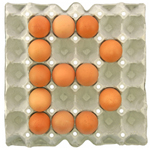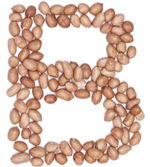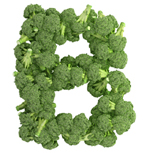A well balanced diet should give you all the energy you need. B Vitamins – also known as the full Vitamin B Complex – support the production of normal energy in the body and there are 8 of them altogether. So what are the B vitamins, where do we find them in the diet and what other roles do they play in the human body?
Vitamin B1: thiamine
 As well as contributing to normal energy production, Vitamin B1 is involved in the production of DNA in the body and also nerve function. It is found in many foods but some of the best sources include wholegrains, vegetables, eggs and liver. Thiamine also contributes to the normal function of the nervous system and the heart.
As well as contributing to normal energy production, Vitamin B1 is involved in the production of DNA in the body and also nerve function. It is found in many foods but some of the best sources include wholegrains, vegetables, eggs and liver. Thiamine also contributes to the normal function of the nervous system and the heart.
Vitamin B2: riboflavin
 Vitamin B2 works in the body to help break down fatty acids and convert them to energy. Good sources of Vitamin B2 include milk, eggs and brown rice. Vitamin B2 also helps in the maintenance of normal vision and contributes to the normal metabolism of iron in the body.
Vitamin B2 works in the body to help break down fatty acids and convert them to energy. Good sources of Vitamin B2 include milk, eggs and brown rice. Vitamin B2 also helps in the maintenance of normal vision and contributes to the normal metabolism of iron in the body.
Vitamin B3: niacin
 Vitamin B3 plays an important role in breaking down sugars (glucose), fats (lipids) and proteins in the body and converting them to energy. It contributes to the normal functioning of the nervous system as well as the reduction of tiredness and fatigue. Vitamin B3 is found in meat, fish, wholegrains and yeast.
Vitamin B3 plays an important role in breaking down sugars (glucose), fats (lipids) and proteins in the body and converting them to energy. It contributes to the normal functioning of the nervous system as well as the reduction of tiredness and fatigue. Vitamin B3 is found in meat, fish, wholegrains and yeast.
Vitamin B5: pantothenic acid
 Vitamin B5 contributes to the production of energy in the body by helping to break down fatty acids and carbohydrates. Vitamin B5 is found in larger quantities in meats, wholegrains, avocado and broccoli as well as eggs. It also contributes to normal mental performance, helping you stay sharp!
Vitamin B5 contributes to the production of energy in the body by helping to break down fatty acids and carbohydrates. Vitamin B5 is found in larger quantities in meats, wholegrains, avocado and broccoli as well as eggs. It also contributes to normal mental performance, helping you stay sharp!
Vitamin B6: pyridoxine
 Vitamin B6 helps metabolise sugars (glucose) and fats (lipids) in the body. Pork, poultry, chickpeas and wholegrain cereals all contain good levels of Vitamin B6. Vitamin B6 contributes to normal function of the immune system and also to the regulation of hormone activity, making it an essential vitamin for women struggling with PMS or the menopause.
Vitamin B6 helps metabolise sugars (glucose) and fats (lipids) in the body. Pork, poultry, chickpeas and wholegrain cereals all contain good levels of Vitamin B6. Vitamin B6 contributes to normal function of the immune system and also to the regulation of hormone activity, making it an essential vitamin for women struggling with PMS or the menopause.
Vitamin B7: biotin
 Biotin is important for cell growth in the body. It is found in many foods but in particular peanuts, green leafy vegetables and liver are considered good sources. As well as contributing to normal energy production in the body, biotin also contributes to the maintenance of normal hair and skin, making this vitamin one to help you look your best!
Biotin is important for cell growth in the body. It is found in many foods but in particular peanuts, green leafy vegetables and liver are considered good sources. As well as contributing to normal energy production in the body, biotin also contributes to the maintenance of normal hair and skin, making this vitamin one to help you look your best!
Vitamin B9: folic acid
 Folic acid plays an important role in growth and cell development. It is also known as ‘folate’ and is found in cruciferous vegetables (such as broccoli, Brussels sprouts, cabbage, kale and cauliflower) as well as spinach and asparagus. Folate contributes to maternal tissue growth during pregnancy, which is why many pregnant women are advised to take a folic acid supplement. Folate also contributes to the reduction of tiredness and fatigue.
Folic acid plays an important role in growth and cell development. It is also known as ‘folate’ and is found in cruciferous vegetables (such as broccoli, Brussels sprouts, cabbage, kale and cauliflower) as well as spinach and asparagus. Folate contributes to maternal tissue growth during pregnancy, which is why many pregnant women are advised to take a folic acid supplement. Folate also contributes to the reduction of tiredness and fatigue.
Vitamin B12: cobalamin
 Vitamin B12 is involved in the metabolism of protein, carbohydrates and lipids. It is also an essential vitamin for the production of blood cells, contributing to normal red blood cell formation and plays a role in cell division. Meat, fish and dairy products are all good sources of Vitamin B12, and for vegans, there are many foods which are fortified with Vitamin B12 such as breakfast cereals and soya (check the labels before you buy!)
Vitamin B12 is involved in the metabolism of protein, carbohydrates and lipids. It is also an essential vitamin for the production of blood cells, contributing to normal red blood cell formation and plays a role in cell division. Meat, fish and dairy products are all good sources of Vitamin B12, and for vegans, there are many foods which are fortified with Vitamin B12 such as breakfast cereals and soya (check the labels before you buy!)
For more information on these energy-boosting B-Vitamins as well as other vitamins and minerals why not visit VitFacts?
